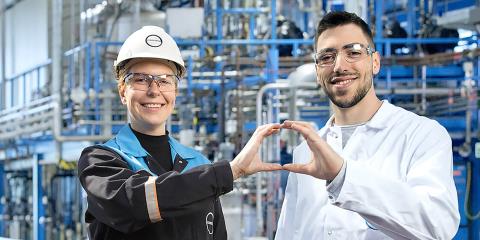
Bio-based Isocyanate PDI
From corn starch to sustainable chemistry
A multidisciplinary Covestro team has developed a process to produce the world's first bio-based isocyanate. Since 2019, our BIL (Basic Isocyanates Leverkusen) plant has been transforming corn-based raw materials into PDI (Pentamethylene Diisocyanate), replacing traditional fossil-based sources. An important milestone to significantly advancing a sustainable polyurethanes production.
Corn replaces fossil raw materials
The isocyanates consist of 70 percent bio-based raw materials. This allows the CO2 footprint to be reduced by up to 30 percent compared to comparable products made from fossil raw materials.
Bio-based solution for everyday products
Known commercially as Desmodur® eco N 7300, this bio-based isocyanate is used in the production of adhesives, paints, and coatings.













